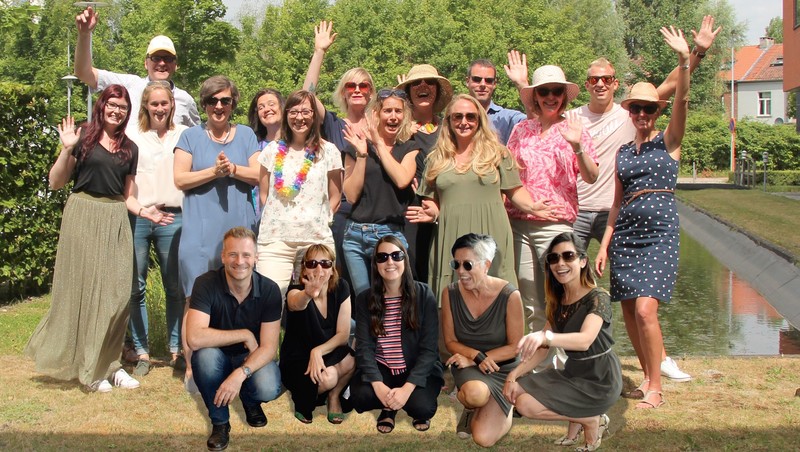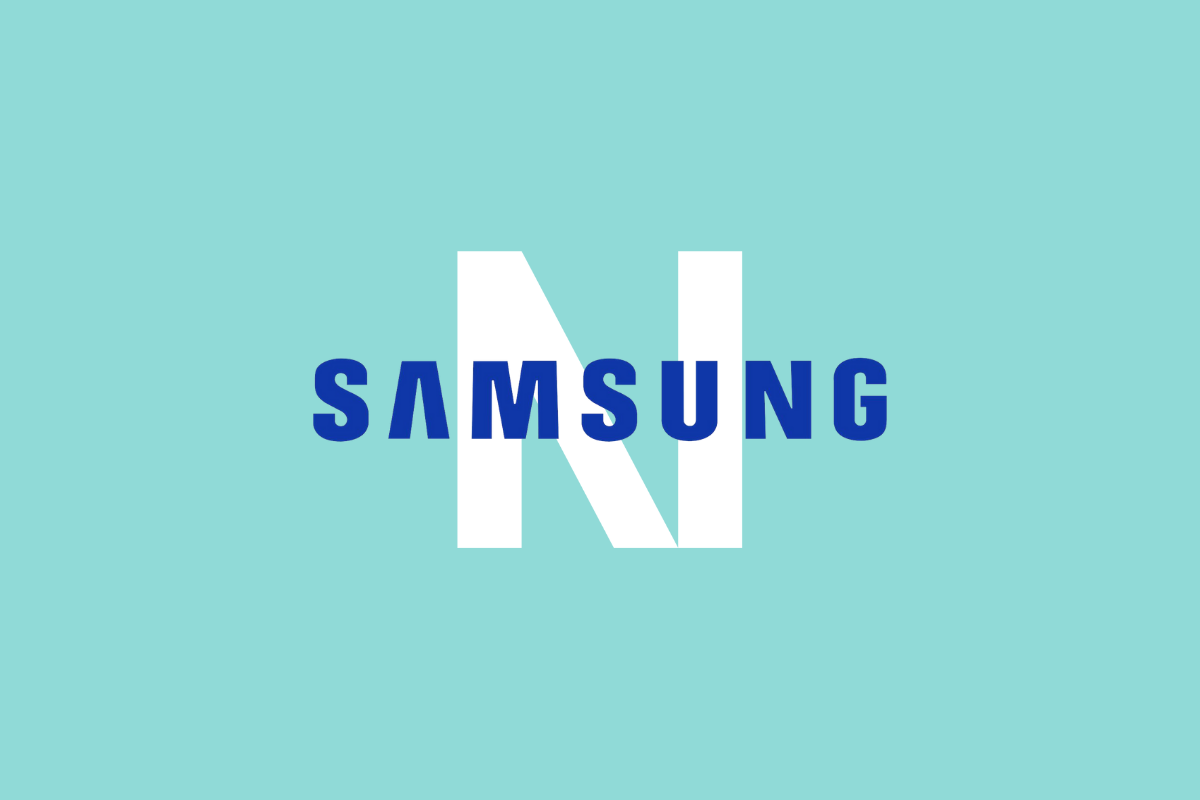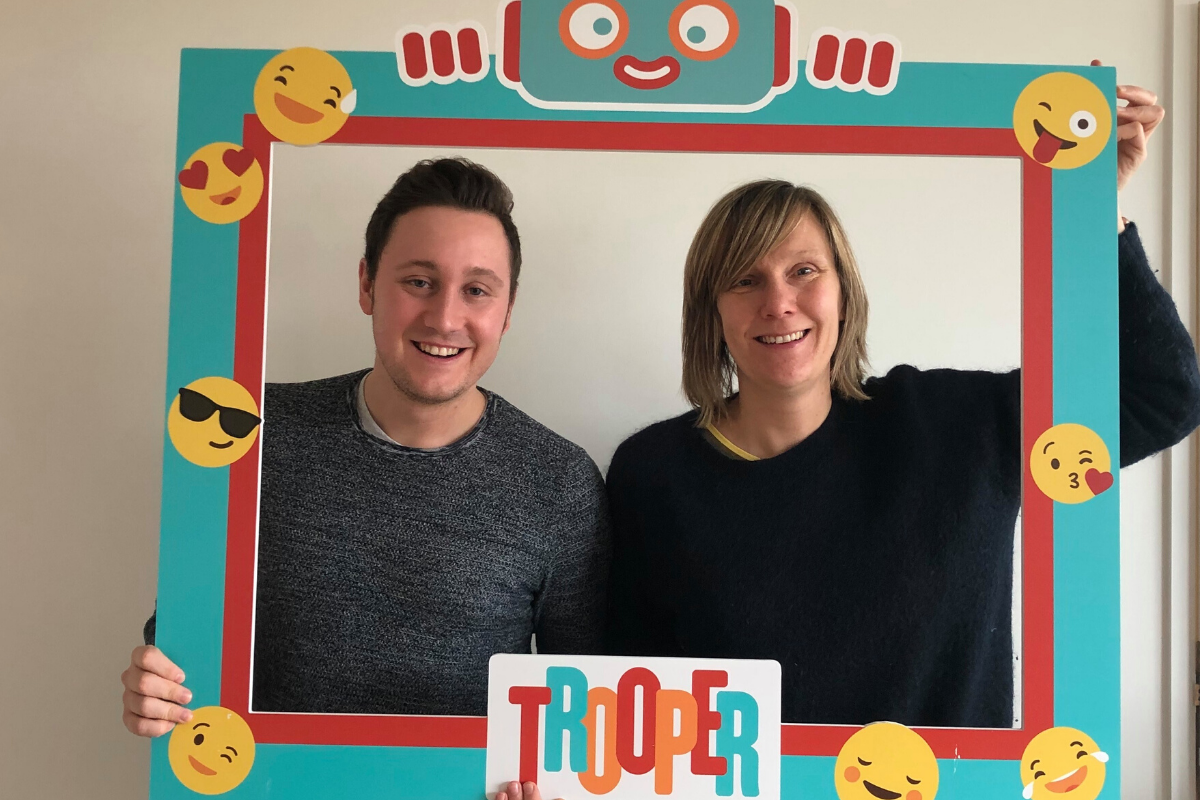To achieve its digital transformation, Wolters Kluwer opts for a mix of young talent and experience.
Digital transformation requires digital literacy. As an organisation, you can increase your in-house knowledge by attracting young digital talent, and by training your existing employees. Equally important is the establishment of the right mindset throughout the entire organization. An open and transparent communication with your employees is key therefore. Wolters Kluwer, originally an offline publishing company, is in the midst of that transition phase. Marianne Saman, Head of Marketing Benelux at Wolters Kluwer Belgium, explains to us how they have succeeded in embracing the digital transformation.

Digitization of the product range
The very first step towards digital transformation was taken by Wolters Kluwer more than a decade ago. That's when the originally offline publishing house started digitising its paper books – their core product at the time – and decided to start anticipating the fact that this market would decline year after year. “The digitization at product level is 80% complete, 20% is still print only today. Perhaps that will someday drop to around 10%, but the paper book will never completely disappear," states Marianne Saman.
"We obviously see the need to streamline all our internal processes digitally,but the reality is that we do not yet see what the end of our transformation process will bring"
The digital organisation of your own company, meaning the complete integration of all internal processes and systems, proves to be much more challenging. This challenge is particularly complex for Wolters Kluwer, which is a conglomerate of various companies that were acquired over the years. “Our organization consists of many divisions, each with its own tools and systems that do not really communicate with one another. We obviously see the need to streamline all our internal processes digitally, but the reality is that we do not yet see what the end of our transformation process will bring. Moreover, as a listed company, you are always a bit apprehensive about the impact of such a fundamental change.”
Conquer the mountain one step at a time
Always start from the long-term goal, that's the answer we often get when we ask how you should tackle this as a company. "You will conquer the mountain one step at a time. However, if you roll out an action plan without knowing where you want to be within five or even ten years, you will be left with a bunch of mini-projects that run parallel, but not in alignment. As a result, it will take twice as long and you need twice as many people."
“Once you decide to take a specific road, it is important that you follow it consistently, no matter what happens. If a plan does not work, it should obviously be adjusted accordingly. But without compromising on the objectives." There's too much hesitation still, Saman thinks. "Halfway through, companies start wondering if they shouldn't have gone the other route after all and often go back to square one. This slows down the process, creates frustration, and demotivates people. This is exactly why you should always keep your eye on the end goal. Even if it means suffering for a while and taking a step back before taking two steps forward. Something like that requires a lot of courage and perseverance."
Increase digital awareness
Wolter Kluwer learned from experience that open and transparent communication is key. “You have to explain to employees how and why you take action and grant them sufficient freedom during the implementation. Very often you notice that plans like these are being communicated top down, without the objectives being stated clearly. We still do not sufficiently explain why we do things. This leads to people doubting and wondering whether it is all worth it.”
The entire marketing team of Wolters Kluwer Belgium
Marianne Saman knows that increasing digital awareness in an organization happens at different speeds. “There are differences between departments, but also between individuals within those departments. It actually has nothing to do with age. In my experience, older employees can be highly digitally evolved, while digital natives sometimes take a strikingly conservative stance. ”
Aha-erlebnis during digital immersion
Three years ago, marketing at Wolters Kluwer was organized according to a classic set-up, done by a team stuck in their ways, focusing mostly on the products. “We then decided to launch our own Digital Marketing Academy, during which the entire marketing team, 25 people, was immersed in a digital bath. It was so nice to see how some people suddenly experienced their aha-Erlebnis. Others who were much less open to this, quit because they could not handle the speed and were then replaced by digital profiles.”
“Very often the newcomers are graduates who stay with us after their internship. In the past three years, we have also always taken on graduates from the Digital Masters Academy (knowledge and practical learning trajectory of NedWorks & Google that prepares students for the digital working environment; red.). The advantage of job students and DMA graduates is that they have already experienced our corporate culture, which reduces the chance of a mismatch to almost zero.”
Attractive employer
How does Wolters Kluwer succeed in positioning itself as an attractive employer? “Among other things by reaching out to student associations and proactively looking for students who want to do a summer job with us or take on an internship as part of their master's program. Finding candidates is by no means a problem," laughs Marianne Saman. “We have so many ongoing projects that there is something for everyone: social media, marketing automation, content marketing, you name it. Moreover, Wolters Kluwer has a loose hierarchical structure and we are very flexible when it comes to working from home. These things have a strong appeal with students."
In order for the digital transformation to succeed, you do need the right mix of experienced and young talent. This is why it is so important that you, as a company, put a lot of effort into a well-thought-out HR policy. "We have been named Top Employer for the umpteenth year in a row, a certificate which is awarded to companies that demonstrate a future-oriented HR policy and offer their employees optimum working conditions and opportunities for growth," Marianne Saman explains. "Such a quality label makes it considerably easier to attract the right digital candidates."
Few fixed functions and tasks
And how do you, as an employer, prevent your best people from leaving? “The many changes ensure that it remains sufficiently challenging for a young marketer. The fact is that there are few permanent positions and responsibilities in our marketing department, and we rely on 'roles'. Since the transformation within our team is still in full swing, those roles can change all the time. We have a large board with five major projects on there, including the names of all the people focusing on each project. The fact that we are constantly mixing things up makes it exciting, and thus also challenging, for everyone. When a student applying for a job for the first time sees that board, their eyes start to sparkle immediately.”
"With the help of a personal development plan, every employee can indicate in which direction they wish to evolve and which additional training courses they would like to follow, depending on budget and availability," says Saman.
The positive impact of young talent
At the end of our conversation, she mentions the impact young talent can have on a digital transformation project. “After we recruited a first graduate through DMA, it soon became apparent that we had brought in a very talented person, highly sought after by various departments, who was being coaxed on all sides. By placing him in our 'Center of Excellence', he can excel as a Google Analytics expert in an international context and thus share his knowledge throughout the company.”
It is no coincidence that this is a marketer with a particularly strong analytical ability, a profile that, according to Saman, is worth its weight in gold on the market. “By now, everyone can use Google Analytics to draw a number of conclusions from it themselves. However, this does not mean that every digital marketer knows how to use these insights to build powerful dashboards and concrete action plans. Having a skilled marketing data analyst in-house will have a huge impact on your marketing budget. It has allowed us to save no less than 30%."
Keep reading.




